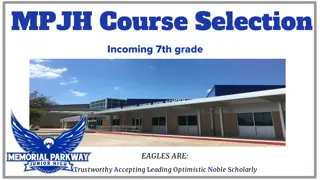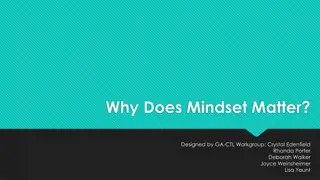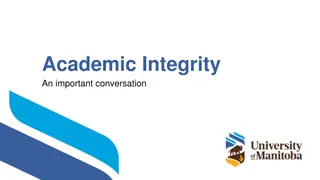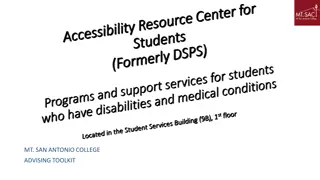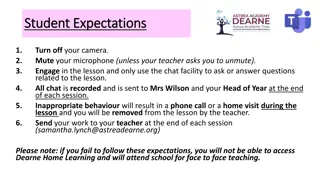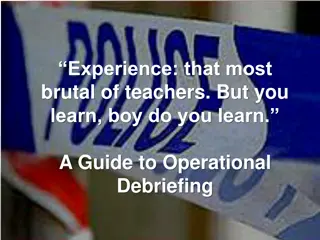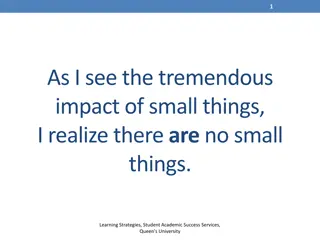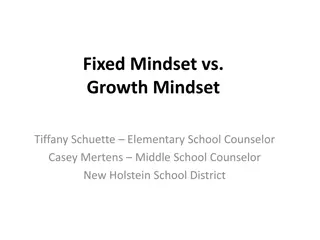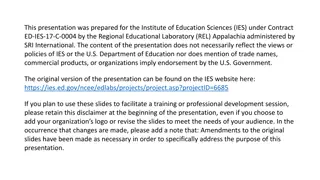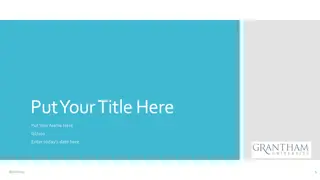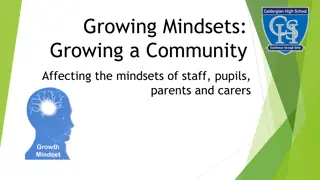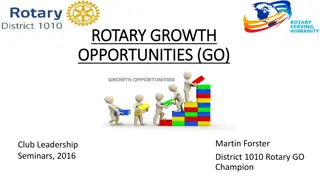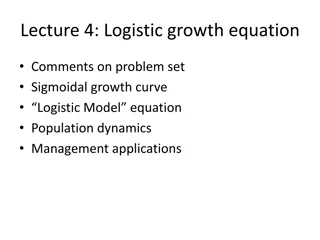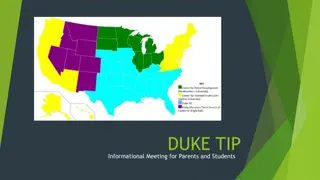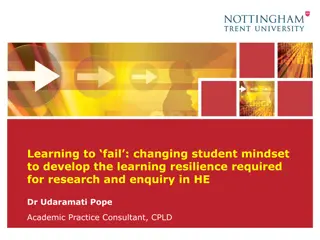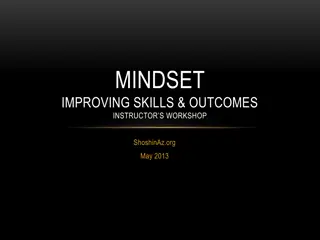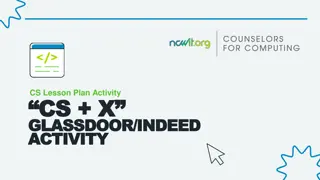Creating Growth Mindsets in CISD Students through Advanced Academic Opportunities
Explore the importance of advanced academics in CISD schools to equip students with the necessary skills for a competitive post-secondary future. Emphasizing the need for soft skills development and the preparation advanced academics provide for upcoming challenges. The approach focuses on rigorous learning methodologies to enhance student growth and success.
Download Presentation

Please find below an Image/Link to download the presentation.
The content on the website is provided AS IS for your information and personal use only. It may not be sold, licensed, or shared on other websites without obtaining consent from the author.If you encounter any issues during the download, it is possible that the publisher has removed the file from their server.
You are allowed to download the files provided on this website for personal or commercial use, subject to the condition that they are used lawfully. All files are the property of their respective owners.
The content on the website is provided AS IS for your information and personal use only. It may not be sold, licensed, or shared on other websites without obtaining consent from the author.
E N D
Presentation Transcript
1 1 CISD ADVANCED ACADEMICS Creating Growth Mindsets in CISD Students
Why Advanced Academics? 2 2 Provide open access to multiple Adv. Academic opportunities Start Adv. Academic coursework in 6th grade CISD students show talent & promise for their post-secondary future. CISD students need to be competitive in the post- secondary market WHY? Offer Advanced Academic opportunities in: Pre- Advanced & Advanced Placement Dual Credit OnRamps HOW ? WHAT ? Start With Why, Simon Sinek
3 3 WHY ADVANCED ACADEMICS
Because Generation Z needs guidance 4 4 During the years of 2010 to 2015, somewhere between 60-80 percent of our kids moved back home after college (p. 11) Don t need adults to get information (avg. of 5 screens), but for interpretation and processing data (p. 25) Teen attention spans have gone from 12 seconds in 2000 to 6 seconds today (p. 41) Today s typical high school student endures the same anxiety levels as a psychiatric patient did in the 1950 s (p. 62) Marching off the Map, Dr. Tim Elmore
Because our students need to grow soft skills 5 5 Soft Skills Soft Skills Tenacity/Grit Organization/ Responsibility Teamwork/ Cooperation Composure/ Resilience Curiosity/ Ingenuity Leadership/Communication Style Correlation with High School GPA Correlation with High School GPA .41 .38 .27 .25 .21 .19 ACT, Positive Effect of Teaching Social & Emotional Learning Skills
Because advanced academics will prepare them for what s next 6 6 Federal studies of transcript analysis reach the conclusion that completing a challenging high school curriculum challenging high school curriculum is the strongest pre- collegiate indicator of a bachelor s degree completion (p. 23) On occasion, they have to be allowed to fail- but in a controlled fashion, where they learn from their failure and emerge motivated to try harder next time (p. 197) College & Career Ready, David Conley
7 7 HOW ADVANCED ACADEMICS
Were going to provide rigorous & relevant Learning 8 8 ALL advanced academics classes will have elements of WICOR Writing Inquiry Collaboration Organization Reading Students will learn research skills Students will learn to problem solve individually & in groups Students will have to read outside of class Students will think critically
Were going to change their mindset 9 9 Growth mindset is based on the belief that your basic qualities are Growth mindset is based on the belief that your basic qualities are things that you can cultivate through your things that you can cultivate through your efforts and and help from others help from others (p. 7) (p. 7) efforts, your , your strategies strategies, , Effort is what makes you smart and talented (p. 16) Students with the growth mindset showed an increase in their grades over two years (p. 57) Those with a growth mindset found success in doing their best, learning and improving(p. 98) Those with a growth mindset found setback motivating (p. 99) Praising children s intelligence harms their motivation & it harms their performance (p. 178) Every single day parents are teaching their children whether mistakes, obstacles, and setbacks are bad things or good things (p. 219) Mindset: The New Psychology of Success, Dr. Carol Dweck
Were going to gift them failure 10 10 We have taught kids to fear failure, and in doing so, we have blocked the surest & clearest path to their success (p. xi) Parents, after all, are judged by their children s accomplishments rather than their happiness, so when our children fail, we appropriate those failures as our own (p. xix) Over parenting teaches kids that without our help, they will never be able to surmount challenges (p. 38) Pressured Parent Phenomenon- we can t rest until we feel our child is safe- has gained admission to that certain magnet school or won a spot on the orchestra or made the varsity team (p. 126) The setbacks, mistakes, miscalculations & failures we have shoved out of our children s way are the very experiences that teach then how to be resourceful, persistent, innovative & resilient citizens of this world (p. xii) The Gift of Failure, Jessica Lahey
Were going to let the Struggle be REAL 11 11 Angela Duckworth has found that the ability to attend to a task and stick to long-term goals is the greatest predictor of success, greater than academic achievement, extracurricular involvement, test scores, & IQ (p. xxi) If we don t allow children to struggle in their learning process, they won t develop the life skills they ll need to succeed as adults (p. 133) Resourcefulness & resilience are two of the most important meta- competencies today (p. 112) Getting an A measures that the student know how to play the game of school. It does NOT always, as practiced, demonstrate real mastery of material (p. 227) The Gift of Failure, Jessica Lahey
Especially in Middle School 12 12 Middle School teachers ask students to succeed at tasks that their half-cooked, adolescent brains are not yet able to master, and therefore, failure is not an if proposition, it s a matter of when (p. 136) That s what middle school failures provide, low-stakes testing & experimentation with the tools that will work best the next time around (p. 156) The Gift of Failure, Jessica Lahey
Were going to provide support, NOT answers 13 13 Have him set aside 15 minutes a week at home to clean out and file loose paper (p. 152) Let kids choose their courses. If they don t feel ready for an honors-level course, listen to them (p. 166) The student should always be encouraged to speak to the teacher directly (p. 199) because because If your child can t write a ten-page research-based argumentative paper by his or her first year in college, it s too late (p. 172) I do not know of any employer who still asks about the GPA of a young prospect, but I do know they are asking about creativity, soft skills, and executive functioning(p. 152) The Gift of Failure, Jessica Lahey
14 14 WHAT ADVANCED ACADEMICS
Pre Pre- - Advanced Placement & Advanced Placement & Advanced Placement Advanced Placement Dual Credit Dual Credit OnRamps OnRamps 15 15 Students take classes that are more challenging & at a faster pace than the traditional high school course. Exams at the end of the year are taken to earn college credit. Courses that simultaneously give high school & college credit. Students should expect a high level course that has the rigor of a college course. Students are concurrently enrolled in a high school and college course. Self-regulated learning is required. Description High school credit is awarded on the high school transcript & college credit is awarded on college transcript. The grades in the high school course & the college class may differ. Students must score a 3, 4, or 5 on the AP exam in May in order to receive college credit. High school & college credit is awarded. The same grade applies to both credits. Credit The high school course is evaluated & facilitated by an OnRamps certified high school teacher. The college course is evaluated & monitored by a UT professor. Courses are taught by college instructors and/ or high school teachers with a Master s degree in that subject area. Courses are taught by high school teachers trained by College Board. Teacher Universities have different scores acceptances that must be met in order to receive credit. Credit accepted by public state schools in Texas at the discretion of the college or university. Core credit guaranteed to transfer to any public state college or university. College Acceptance Students must meet specific requirements of the college & meet passing scores on the TSI test. Meet high school requirements to enroll in AP. Enrollment Meet pre-requisite course requirements. CISD pays for 1 OnRamps class per semester. Additional classes cost $149 per semester or $99 for free/reduced lunch students CISD pays for 1 Hill College class per semester. Additional classes cost about $252.00 per semester. Students pay $40 per test, $10 per test if free/reduced lunch Cost
When is enough enough? 16 16 College Board says that a student who is exposed to 2 college preparatory courses is ready to take on college level work Just because you CAN doesn t mean you SHOULD GPA vs. Student happiness Trevor Packer, Senior Vice President of Advanced Placement Instruction


